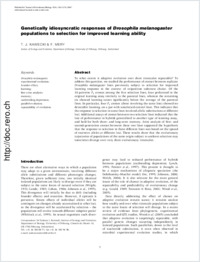Genetically idiosyncratic responses of Drosophila melanogaster populations to selection for improved learning ability
- Kawecki, Tadeusz J. Section of Ecology and Evolution, Department of Biology, University of Fribourg, Switzerland
- Mery, Frederic Section of Ecology and Evolution, Department of Biology, University of Fribourg, Switzerland
-
23.01.2006
Published in:
- Journal of Evolutionary Biology. - 2006, vol. 19, no. 4, p. 1265-1274
Drosophila melanogaster
Experimental evolution
Founder effect
Learning
Line-cross analysis
Memory
Outbreeding depression
Parallel evolution
Repeatability of evolution
English
To what extent is adaptive evolution over short timescales repeatable? To address this question, we studied the performance of crosses between replicate Drosophila melanogaster lines previously subject to selection for improved learning response in the context of oviposition substrate choice. Of the 10 pairwise F1 crosses among the five selection lines, four performed in the original learning assay similarly to the parental lines, whereas the remaining six showed learning scores significantly below the average of the parental lines. In particular, four F1 crosses (three involving the same line) showed no detectable learning, on a par with unselected control lines. This indicates that the response to selection in some lines involved allelic substitutions at different loci. Additional assays of crosses between two selection lines indicated that the loss of performance in hybrids generalized to another type of learning assay, and held for both short- and long-term memory. Joint analysis of first- and second-generation crosses between these two lines supported the hypothesis that the response to selection in these different lines was based on the spread of recessive alleles at different loci. These results show that the evolutionary trajectories of populations of the same origin subject to uniform selection may sometimes diverge over very short evolutionary timescales.
- Faculty
- Faculté des sciences et de médecine
- Department
- Département de Biologie
- Language
-
- English
- Classification
- Biological sciences
- License
- License undefined
- Identifiers
-
- RERO DOC 5875
- DOI 10.1111/j.1420-9101.2005.01071.x
- Persistent URL
- https://folia.unifr.ch/unifr/documents/299972
Statistics
Document views: 175
File downloads:
- kawecki_gir.pdf: 157
